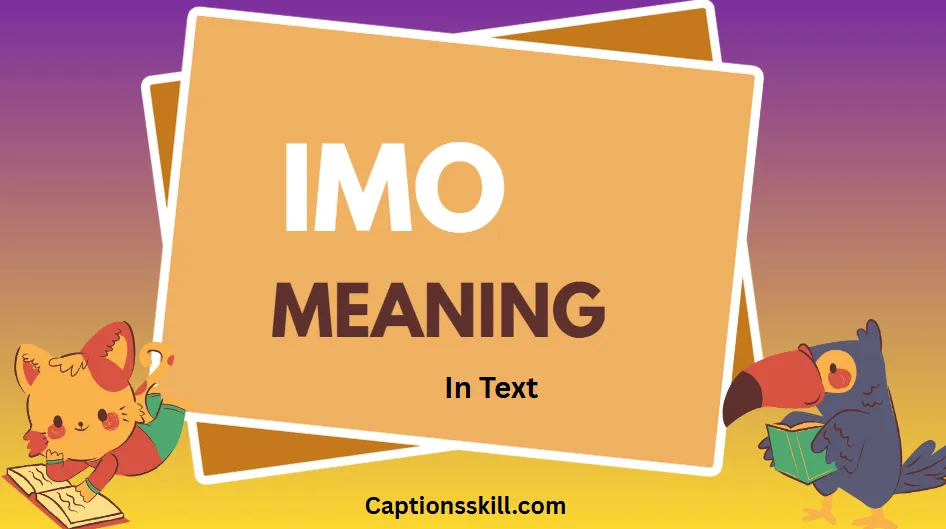In the world of digital communication, acronyms play a vital role in saving time and effort. One of the most widely used acronyms is “IMO”, commonly seen in social media posts, text messages, online forums, and comment sections. Whether you are chatting with friends, engaging in a heated debate on Reddit, or simply expressing your opinion in a group chat, you’ve probably encountered or even used “IMO” before.
Understanding the meaning behind acronyms like “IMO” is essential, especially in today’s fast-paced online world where words are shortened, and meanings can shift quickly. If you’re someone who often wonders what others mean when they say “IMO,” or you’ve seen people use it in both serious and funny contexts, this article will guide you through everything you need to know.
This guide is written in very simple and clear language, so that even a young child could read and understand. From its basic definition to funny interpretations, cultural relevance, pronunciation, and even its place in dictionaries—we will cover every angle of the phrase “IMO” and why it’s important in text communication today.
What Does “IMO” Mean?
IMO stands for “In My Opinion.” It is a short way to tell someone that you are sharing your personal thoughts, views, or ideas. Instead of writing a long sentence like “I think this is the best option,” people often write “IMO, this is the best.”
It helps make texting and chatting faster. People often use it when they are not 100% sure about something or when they just want to show that it’s their point of view—not a fact.
Here are some common ways people use “IMO”:
IMO, pizza is better than burgers.
The movie was boring, IMO.
IMO, he should have waited longer.
Using “IMO” makes your statement sound softer and more polite. It shows that you’re not trying to force your view on others.
The Origin and Evolution of “IMO”
The term “IMO” started appearing online in the early days of internet chatrooms and forums like IRC (Internet Relay Chat), AOL, and early message boards in the 1990s. As people wanted to type fast, acronyms became common.
“IMO” became one of the many short forms used to keep online discussions smooth and short. It joined other popular internet abbreviations like LOL (Laugh Out Loud) and BRB (Be Right Back).
As technology grew, and platforms like Twitter, WhatsApp, and Instagram became popular, so did the use of “IMO.” Its evolution shows how language adapts to speed and convenience, especially in digital communication.
Even today, “IMO” continues to be widely used on new platforms like TikTok and in gaming chats, proving that it’s still relevant.
Is “IMO” a Slang, Acronym, or Name?
IMO is an acronym, which means it is formed from the first letters of a phrase—in this case, “In My Opinion.” However, over time, it has also started acting like slang, because of how casually people use it.
It is not a name unless someone uses it creatively or humorously in usernames or branding, which some people do. But in texting, “IMO” is almost always an abbreviation for sharing one’s thoughts.
Sometimes people even make jokes using “IMO” as a name. For example:
“IMO was right again today!”
Here, it may sound like someone’s name, but it’s still just the acronym.
“IMO” Pronunciation & Spelling
“IMO” is usually not spoken out loud, but when it is, most people spell out the letters individually as “I-M-O.” This is because it’s not a real word that you can pronounce like a name or noun.
Some might jokingly say “eye-mo,” but that’s not standard.
In writing, it is always spelled in capital letters—IMO—though some people write it in lowercase (imo) in casual texting. Both are accepted, and the meaning doesn’t change.
So you can write:
IMO, that was not fair.
or
imo, that’s a terrible idea.
Both are correct in informal writing.
How People Use “IMO” Today
In modern texting and social media, “IMO” is used in many different situations. It can be serious, funny, helpful, or even sarcastic. Here’s how:
Many people use it to start a statement in online arguments or debates. It helps them say something without sounding rude or bossy.
Example: IMO, the team played better without him.
It can also be used to give gentle advice.
Example: IMO, you should wait before making a decision.
Sometimes, people use it to make jokes or say silly things in a polite way.
Example: IMO, pineapple on pizza is a crime.
In funny contexts, people stretch the meaning and make it sound like super serious wisdom, even when it’s not.
Example:
IMO, cats are the true rulers of Earth.
IMO, socks disappear because they go to sock heaven.
In group chats, “IMO” helps people speak their mind without making it sound like an argument. It keeps things light and respectful.
And in professional discussions, it adds clarity.
Example: IMO, the second draft of the project is more polished.
Today, “IMO” is used by people of all ages, especially online. It helps keep the tone friendly and open.
Examples of “IMO” in a Sentence
- IMO, this is the best song on the album.
- That dress looks amazing on you, IMO.
- IMO, the book was better than the movie.
- She deserves the promotion, IMO.
- IMO, it’s time we started saving more.
- That was not his best performance, IMO.
- IMO, you should speak to her directly.
- The ending didn’t make sense, IMO.
- IMO, Android phones are more flexible.
- That meme was the funniest part of my day, IMO.
- IMO, you can never have too much cheese.
- The hike was harder than expected, IMO.
- IMO, this strategy won’t work long-term.
- IMO, cats are better than dogs.
- IMO, we should meet earlier next time.
- The story felt rushed at the end, IMO.
- IMO, he was just trying to help.
- IMO, this filter is overused.
- IMO, Mondays should start at noon.
- That movie deserves more credit, IMO.
Other Possible Meanings of “IMO”
While “IMO” mostly means “In My Opinion,” it can also mean other things depending on the context:
- International Maritime Organization – A part of the United Nations.
- In Memory Of – Used in emotional or tribute messages.
- Instant Messaging Online – Though rare, some use it this way.
- I Might Object – Seen in legal or debate circles.
But in texting and chats, “IMO” almost always means “In My Opinion.” Still, it’s good to be aware of the other meanings so you don’t get confused.
Words and Acronyms Related to “IMO”
Here are some related terms you might see along with or instead of IMO:
- IMHO – In My Humble Opinion
- TBH – To Be Honest
- FYI – For Your Information
- IDK – I Don’t Know
- ICYMI – In Case You Missed It
- AFAIK – As Far As I Know
- LOL – Laugh Out Loud
- BRB – Be Right Back
These acronyms are often used in the same types of conversations, especially informal texts and social media.
Is “IMO” in the Dictionary?
Yes, “IMO” is listed in many modern dictionaries, especially online dictionaries and language databases that keep up with internet slang.
Websites like Merriam-Webster, Cambridge Dictionary, and Urban Dictionary all include IMO as an accepted abbreviation for “In My Opinion.”
Even though it’s not a full “word,” it’s recognized because of how commonly it’s used. Language evolves, and dictionaries reflect that.
Its listing in formal dictionaries shows how internet language is now part of mainstream communication.
Better Alternatives to Say “IMO”
Sometimes, using “IMO” might not fit the tone or platform. Here are other ways to say the same thing:
In my view
From my point of view
Personally, I think
As far as I’m concerned
If you ask me
I believe that…
To me, it seems like…
These phrases are better when writing emails, essays, or more formal texts. You can still express your opinion without sounding too casual.
For example:
Instead of: IMO, we should reschedule.
Use: Personally, I think we should reschedule.
This makes your message sound more professional while still showing it’s your opinion.
Cultural and Generational Impact of “IMO”
IMO shows how communication has changed with generations. Younger people prefer speed and simplicity. That’s why short forms like IMO are everywhere.
Older generations may not use “IMO” much, but they’re starting to understand it because their kids or coworkers use it.
On platforms like TikTok, X (formerly Twitter), Discord, Reddit, and gaming communities, IMO is part of a shared culture. It helps people feel included and adds flavor to conversations.
Also, in some online jokes or memes, people twist “IMO” into sarcastic or humorous lines, making it more fun and playful.
The phrase has also inspired funny versions like:
IMHO – In My Humble Opinion
IMAO – In My Arrogant Opinion
IMLTHO – In My Less Than Humble Opinion
Why It’s Important to Know These Words
Knowing what “IMO” means helps you communicate better online. You’ll understand what others are saying and avoid confusion.
It also helps you reply properly. If someone writes “IMO, that movie is trash,” you know they’re just sharing a thought—not insulting you.
It saves time and makes you sound more connected to the digital world.
For students, professionals, or anyone who texts, knowing these small acronyms can make a big difference.
Also, it shows that you’re keeping up with modern language trends and can participate in online discussions with ease.
The Future of the Word “IMO”
As digital communication grows, acronyms like IMO will keep evolving. New platforms might create new meanings or shorten words even more.
But “IMO” is simple and useful, so it’s likely to stay popular for years.
In the future, we might see voice-based texting apps where people say “IMO” out loud, or even AI tools that auto-detect opinion phrases and replace them with emojis or phrases.
Language keeps changing, but acronyms like IMO will likely adapt and remain part of our daily texting habits.
Frequently Asked Questions (FAQs)
Q1: What does IMO mean in text?
A1: IMO stands for “In My Opinion.”
Q2: Is IMO rude?
A2: No, it actually makes your opinion sound softer and more respectful.
Q3: Is IMO formal?
A3: No, it’s best used in casual or informal settings.
Q4: What’s the difference between IMO and IMHO?
A4: IMHO adds “humble,” but both mean you’re sharing your opinion.
Q5: Can IMO be used in emails?
A5: Yes, but only in casual or friendly emails.
Q6: Is IMO used in business chats?
A6: Sometimes, but more formal words like “I believe” are preferred.
Q7: Do dictionaries recognize IMO?
A7: Yes, many online dictionaries include it.
Q8: Are there funny meanings for IMO?
A8: Yes, people joke it means “I’m obviously right.”
Q9: Is IMO only used online?
A9: Mostly, but people sometimes say it in real life jokingly.
Q10: Can kids use IMO?
A10: Yes, it’s safe and simple to use.
Conclusion
The acronym “IMO” may be short, but it carries a powerful role in modern communication. It allows people to express their thoughts politely, quickly, and clearly. Understanding the meaning, usage, variations, and impact of IMO gives you a stronger voice in digital conversations.
As language keeps changing, acronyms like IMO will continue to bridge the gap between speed and clarity. Whether you’re texting a friend or debating online, IMO is here to stay—simple, useful, and smart.
Also Read : ooo meaning

Jean Moreau is a talented writer known for crafting engaging captions that resonate with audiences. His creativity enhances social media content effectively.






Leave a Reply